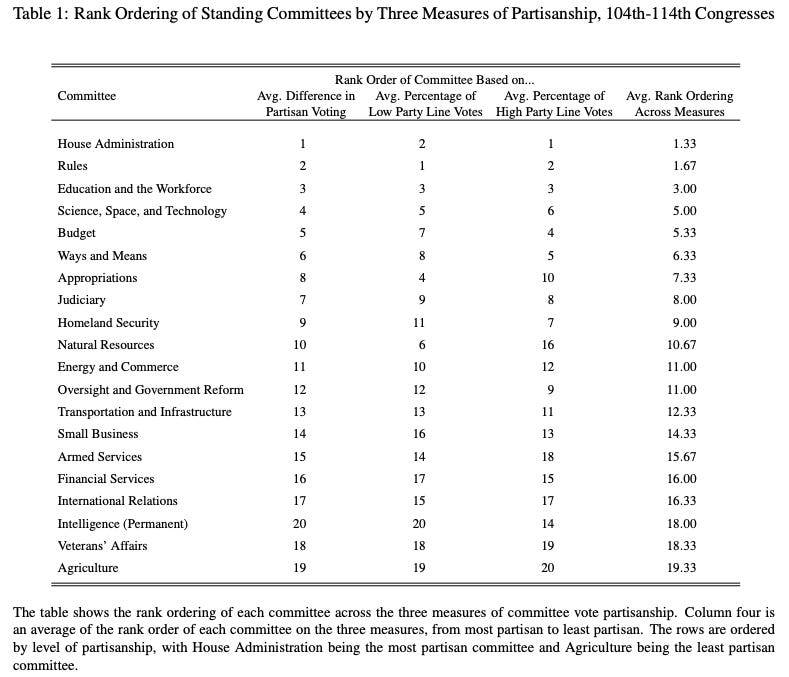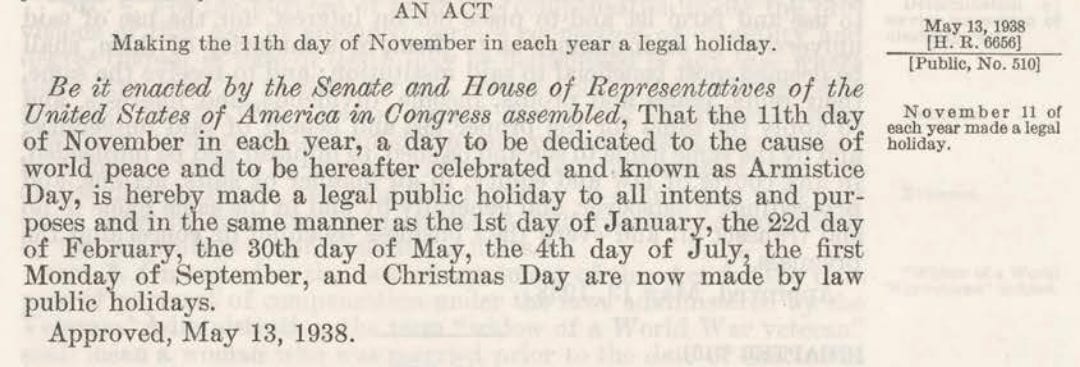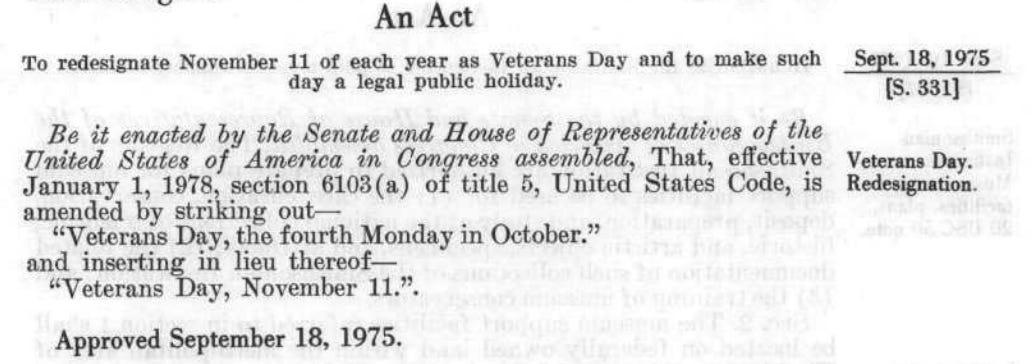How Congress is Helping Veterans
One of the most bipartisan issues in Washington.
Good morning! The big news out of Washington last night was the Senate’s passage of a bill funding agriculture, veterans affairs, and legislative operations through September and the rest of the government through January. The vote was 60-40, identical to the procedural vote on Sunday night.
The package now heads over to the House, which is set to return from its extended break tomorrow; once it passes there and is signed by President Trump, the longest government shutdown in history will officially be over.
I’m sure I’ll have more to say about the shutdown saga at some point, perhaps in my next Q&A post. If you have questions about what went down and what comes next, feel free to drop them here. For now, the looming end of the shutdown — and the fact that today is a federal holiday — offers a nice chance to take a breath after more than a month of covering a dysfunctional Congress.
So, in honor of Veterans Day, I thought I’d do something a bit different today and take a look at the bills currently moving through Congress on a single topic: helping the men and women who served our country. This is part of my ongoing effort to shine a light on the so-called “Secret Congress,” covering not just what isn’t getting done in Washington (although there is surely a lot), but also what is: the bipartisan pieces of legislation that will make a real difference to real people but rarely get covered because they aren’t controversial.
To quickly set the table: the Department of Veterans Affairs (VA) is the second-largest Cabinet department by number of employees (after the Department of Defense). It includes the Veterans Health Administration, which is the largest integrated health care system in the U.S., caring for nine million veterans at more than 1,200 facilities. Out of the 12 appropriations bills that fund the government each year, the Veterans Affairs bill (which passed the Senate last night) is typically the third-most expensive (after Health and Human Services and Defense).
Normally, when that many dollars are at stake, it means something will be highly contentious on Capitol Hill. But veterans affairs is one of the most significant areas of cooperation in Congress. A 2019 study found the Veterans’ Affairs Committee to be the second-most bipartisan committee in the House. The veterans panels are also some of the most productive: on both the House and Senate side, the Veterans’ Affairs Committees have considered the second-most pieces of legislation of any committees this Congress. (Maybe it’s because so many of the committee members are veterans, and lawmakers who served in the military have been found to be 35% more effective members of Congress?)

But despite how vast their reach is, and how much they are getting done, you rarely hear about the work coming out of these committees. Let’s fix that today, and see what lawmakers are doing to help our veterans:
First, we should take note of the aforementioned Veterans Affairs appropriations bill, which is poised to become law later this week. The bipartisan package would set aside more than $400 billion for veterans, including $264 billion in education, disability, and other benefits (a 16% increase from last year), $115 billion for VA medical care (roughly flat from last year), and $53 billion for the Toxic Exposure Fund, which was set up by the Honoring our PACT Act of 2022 to care for veterans who were exposed to toxic substances during their service (a 73% increase from last year).
Although the VA isn’t too affected by government shutdowns (because so much of the agency’s workforce are medical caregivers who are deemed “essential”), passage of the appropriations bill will ensure that the VA is untouched if the government shuts down again between now and September 2026. VA programs that have been interrupted by the current shutdown, like career counseling and transition briefings for service members preparing to leave the military, would not be affected next time.
Second, let’s look at bills that have already been signed into law this year. President Trump has signed 36 laws since returning to office; three of them have concerned veterans.
The VA Home Loan Program Reform Act closed a gap between the VA home loan program (which dates back to the GI Bill and is currently used by about four million veterans) and other federal home loan programs, by allowing borrowers to defer up to 25% of their loan balance if they’re at risk of missing their loan payments. The deferred amount is then tacked on to the end of their mortgage term. A similar option is already available to borrowers who participate in other federal home loans programs, but hasn’t been offered under the VA since the Trump administration wound down a Biden-era program earlier this year.
The goal is to help prevent veterans from being foreclosed on. As of May, nearly 90,000 VA loans were seriously past due, including 33,000 already in foreclosure. The measure passed unanimously in both the House and Senate.
The PRO Veterans Act, also passed unanimously in both chambers, seeks to correct for two recent VA scandals. One was an episode last year, when Congress passed a $3 billion budget fix for the VA after the agency told lawmakers it was facing an emergency shortfall, only for the VA to then say it had miscalculated and it hadn’t really needed the money after all. The new law will require the VA to submit quarterly in-person budget reports to Congress, to increase legislative oversight and avoid future shortfalls (or inaccurately declared shortfalls).
The law will also require a certain type of VA bonus to only be given out on an individual basis, rather than as a group, and only with the approval of senior officials, after $11 million in such bonuses were improperly doled out under the Biden administration.
Trump also signed the ACES Act, another unanimous product, which would direct the VA to more thoroughly study cancer rates among military flight crews, in order to investigate a possible link. A 2021 study found that military aviators were at a higher risk of developing prostate cancer and melanoma, and possibly non-Hodgkin lymphoma and testicular cancer as well.
Third, there is one bill that was just sent to the president’s desk. The Medal of Honor Act would quadruple the annual pension for Medal of Honor recipients, from $16,800 to $67,500. The amount would increase along with inflation.
The Medal of Honor is the nation’s highest military decoration, awarded for “conspicuous gallantry and intrepidity at the risk of life above and beyond the call of duty.” Only 61 living Americans are recipients of the award.
“We cannot truly ever repay them,” Sen. Ted Cruz (R-TX), the bill’s sponsor, said on the Senate floor. “There is no sum, there is no medal, there are no words that can measure up to their sacrifice. But there are ways that we can continue to honor them, by ensuring that they are cared for, respected, and supported.”
The measure passed the House in February and the Senate last week, both unanimously.
Fourth, there are pieces of legislation that have passed one chamber or the other.
In September, before leaving for what became a nearly two-month-long recess, the House passed 15 bipartisan veterans bills, including:
The Rural Veterans’ Improved Access to Benefits Act, which would expand the pool of providers who can perform disability exams for veterans who live in rural areas, away from VA clinics.
The Modernizing All Veterans and Survivors Claims Processing Act, which would require the VA to start working on an automation tool to speed its claims processing process. (The VA is currently buried under a deep backlog of claims.)
The Protecting Veteran Access to Telemedicine Services Act, which would allow certain VA health care professionals to make prescriptions via teleconference, permanently extending authorities that were created during Covid to make health care more accessible for veterans (especially those living in rural areas without nearby clinics).
The Delivering Digitally to Our Veterans Act, which would allow veterans to receive digital updates about their GI Bill benefits. (Currently, they can only receive these updates through paper mail.)
The Edith Nourse Rogers STEM Scholarship Opportunity Act, which would expand a program offering scholarships to veterans pursuing STEM degrees.
The Servicemember Residence Protection, which would create a federal prohibition placing service members’ residences off-limits for squatters, even if a state has a law that would otherwise allow the squatter to claim the property based on how long they have occupied it. (There have been several cases in which squatters have taken over service members’ homes while they are deployed.)
The Honoring Our Heroes Act, which would require the VA to provide headstones for veterans no matter when they died. (Currently, these benefits are only available for veterans who have died since November 1990, which means veterans who died before then do not receive headstones acknowledging their military service.)
The Fallen Servicemembers Religious Heritage Restoration Act, which would set up a program to identify deceased service members who were Jewish but were buried at military cemeteries with a Christian cross.
Plus, the Senate passed two veterans bills unanimously on Sunday:
The Veterans’ Compensation Cost-of-Living Adjustment Act, which would increase disability and other VA benefits by 2.8%, in order to keep pace with the cost of living.
The Lactation Spaces for Veteran Moms Act, which would require every VA medical center to have a hygienic lactation space in it.
Thanks for taking a look at these bills with me this Veterans Day. I know bills like the Lactation Spaces for Veteran Moms Act might not sound like they affect very many people — but I can assure you there is a breastfeeding mom out there who will be grateful if that bill becomes a law.
We spend a lot of time focusing on the macro issues in Congress, for good reason. But the micro can be important, too, especially if the people being impacted are men and women who put their lives on the line for our country. If that’s you, thank you for your service.
Before I go, since we spent some time delving into veterans issues in Congress today, I also thought we could take a look at the legislative history of Veterans Day.
November 11 was first set aside as Armistice Day by President Woodrow Wilson in 1919, to mark the one-year anniversary of the armistice with Germany going into effect, ending World War I.
Congress made it a legal holiday — “a day to be dedicated to the cause of world peace and to be hereafter celebrated and known as Armistice Day” — with this law in 1938:
A law in 1954 changed the name to Veterans Day:
Why isn’t Veterans Day on a Monday, like many other federal holidays (even ones that are nominally pegged to a specific anniversary or birthday)?
It actually was, briefly! The Uniform Monday Holiday Act of 1968 — which also moved Presidents’ Day and Memorial Day to Mondays — placed Veterans Day on the fourth Monday in October.
Why not at least keep Veterans Day in November? Some lawmakers protested about that while the measure was being debated. Here’s how the bill’s sponsor explained the decision on the House floor:
By designating it the second Monday in November, we would bring it very close to Thanksgiving Day and it might interfere with election day. So we made it the fourth Monday in October, which is fairly close to the present Veterans Day. It will never be on Halloween and it will never interfere with a national election. It would still be 4 weeks, I believe in every instance, from Thanksgiving Day.
That satisfied majorities in the House and Senate, who passed the bill. But it sparked an outcry among veterans, who demanded that the holiday be returned to its original date; 46 states refused to follow the federal government in switching their observance of Veterans Day away from the original armistice anniversary.
In September 1975, Congress relented and passed a new law returning Veterans Day to November 11:
The vote was 410-6 in the House, with a tiny cohort of lawmakers resisting the change. Rep. Robert McClory (R-IL), for example, described the measure as an “unwarranted attack on the federal schedule of Monday holidays.” McClory cited data from the VA that found that placing Veterans Day as part of a three-day weekend led to a surge in families visiting their veteran relatives at VA hospitals.
Rep. Pat Schroeder (D-CO), who sponsored the bill, retorted that “we have not declared war on Monday holidays, that this is not a secret way to nibble them away or eat them away one by one,” but rather an attempt to bow to the wishes of veterans themselves.
“I think most of the members are in sympathy with Monday holidays,” Schroeder said, “but one of the problems is that when we have 46 states and the group we are honoring, for example, the veterans, and the official spokesmen are saying that is not the day they want to have, it seems to me the federal government should not stand in the way and say, ‘No, you cannot return the date to November 11.’”
Schroeder’s argument won out, and the holiday was placed back on November 11, where it has remained ever since. Happy Veterans Day, everybody.






"Although the VA isn’t too affected by government shutdowns (because so much of the agency’s workforce are medical caregivers who are deemed “essential”)"
I have a nurse friend (neo natal) who works in a military hospital in Temple, TX who is most definitely NOT getting paid. She is absolutely essential and has been working many more shifts so I'm not sure about your statement. But she is paid by DOD, not VA and so is not paid. A fine distinction of 'essential'.
Former Congressional caseworker here — I handled constituent services for a Member with a very veteran-heavy district and presence in Massachusetts. From that perspective, it is sometimes a double-edged sword that the VA Committees are so active: for both veterans and staff at the VA, the rate and volume of legislation means that the agency itself is a chaotic, conflicting hodgepodge of programs, restrictions, pots of funding, designated staff, modernization projects, etc., where nothing sunsets, nothing outdated is replaced, everything is always additive, because every program has a constituency and it's politically unforgiving to be seen as taking something away from veterans (I mean, fair!). Every Member on the VA committee wants to create a new program, and they have a good shot at doing so with the pace of those committees' work and relative bipartisan support for VA-related programs.
Working in the state capacity/Congressional capacity space now, I do think a lot about how we could work to cherrypick the best parts of the one-committee-one-agency model that DOES let legislation move fairly quickly, but coupled with more outcomes-driven approaches to legislating that might be a little bit less prone to creating statutory sediment.